初中一般将来时,(life in the future),结合课文讲解
初中英语《Module4Lifeinthefuture》单元教学设计以及思维导图

主题单元学习目标(说明:依据新课程标准要求描述学生在本主题单元 学习中所要达到的主要目标)
知识与技能:1.语法:一般将来时:will + 原形动词。 2.词汇:cable TV, calculator, cell phone, computer, education,
comfortable 等。 3.功能:预测与想象的表达。
Step 1. 创设情境导入 看图片,在小组内描述图片。
Step 2. 展示学习目标 Step 3. 出示提纲学生自学(讲评课出示学案、训练课出示练习题)
自主完成教材上的习题,巩固所学的知识。 Step 4. 师生互动合作探究(讲评课、训练课:自我纠错、合作合作探究)
1.We won’t travel by bus or bike any more.我们将不再乘公交车或自 行车旅行。
专题划分
(说明:除了说明主题单元将划分成几个专题以及每个专
题所用的课时外,还应说明哪一个专题或专题中的哪一个
活动将以研究性学习活动的形式来开展学习活动。)
专题一:Everyone will study at home. ( 一 课时)
专题二:Everyone will have a small car. ( 一 课时)
专题二
Everyone will have a small car.
所需课时 课内共用一课时,每周五课时;课外共用二课时
专题学习目标 (说明:描述学生在本专题学习中所要达到的学习目标, 注意与主题单元的学习目标呼应)
பைடு நூலகம்
To get necessary information from the reading material.
(完整版)初中一般将来时讲解

(完整版)初中一般将来时讲解初中一般将来时是英语中表达将来时间的一种时态,它用来表示将来某个时间将要发生的动作、事件或情况。
本文将对初中一般将来时进行详细讲解。
一、构成初中一般将来时的构成主要由以下几个部分组成:1. 助动词“will”,用于表示将来。
2. 动词的原形(即不带to的动词原型)。
二、用法初中一般将来时主要有以下几种用法:1. 表示将来的计划或意图。
例如:- I will study harder in order to pass the exam. - They will go on a trip next week.2. 表示预测或推测。
例如:- It will rain tomorrow.- The team will win the game.3. 表示承诺或意愿。
例如:- I will help you with your homework.- We will support you all the way.4. 表示意愿或请求。
例如:- Will you please open the window?- I will go shopping if you want.三、注意事项在初中一般将来时的使用中,需要注意以下几点:1. 助动词“will”后面直接接动词的原形,不带任何变化。
2. 否定句在助动词“will”后面加上“not”构成,缩写形式为“won't”。
3. 疑问句将助动词“will”提到句子的主语之前。
四、例句以下是一些初中一般将来时的例句:1. I will travel to Japan next year.3. Will you go to the beach tomorrow?五、总结初中一般将来时是英语中一种表示将来时间的时态。
在使用时,需要注意助动词“will”的使用以及动词的原形。
它可以用于表示计划、预测、承诺等。
希望本文能够对您的学习有所帮助。
七年级英语下册 知识导学 Module 4 Life in the future一般将来时词句精讲精

本文档仅供文库使用。
百度文库是百度发布的供网友在线分享文档的平台。
百度文库的文档由百度用户上传,需要经过百度的审核才能发布,百度自身不编辑或修改用户上传的文档内容。
网友可以在线阅读和下载这些文档。
百度文库的文档包括教学资料、考试题库、专业资料、公文写作、法律文件等多个领域的资料。
百度用户上传文档可以得到一定的积分,下载有标价的文档则需要消耗积分。
当前平台支持主流的doc(.docx)、.ppt(.pptx)、.xls(.xlsx)、.pot、.pps、.vsd、.rtf、.wps、.et、.dps、.pdf、.txt文件格式。
Module 4 —一般将来时【概念引入】一般将来时表示将来某个时间要发生的动作或存在的状态,将来经常或反复发生的动作,常与表示将来的时间状语连用。
如:tomorrow , tomorrow morning / afternoon …,the day after tomorrow , next year , next month … , from now on (从现在开始),in an hour (一小时后),in two days / weeks …等。
例如:What are you going to do next Sunday ?下周日你打算做什么?The American basketball team will arrive in Beijing tomorrow.美国篮球队明天要到北京。
【语法讲解】1. be going to+动词原形结构(1)表示主体现在的意图,即打算在最近或将来要做某事,主语通常指人。
在被动结构中,主语也可指物,但动作的执行者仍然是人。
例如:We are going to have a class meeting this afternoon. 今天下午我们打算开班会。
She’s going to be a teacher. 她打算作一名教师。
2019-2020年七年级英语下册 Module 4 Life in the future全模块教案 外研版

2019-2020年七年级英语下册 Module 4 Life in the future全模块教案外研版一、教学内容分析本模块以未来的教室及学习为切入点,谈论将来我们生活的各个方面,学生较为有兴趣,便于展开活动。
Unit1的主要内容是涉及一些有关于教室和科学方面的名词,一篇出现了将来时的听力、一段有关未来教室的对话以及相关的几个训练活动,在这个过程中学习和掌握一般将来时WILL+动词原形的陈述,一般疑问句及问答,及否定句。
二、学生情况分析本模块以学生心目中的未来教室为话题,这与学生的现实生活密切相关,他们有话可说,乐于参与课堂活动,而涉及的语法项目是一般将来时will 的陈述句,否定句,一般疑问句及回答,动词不用任何的变化,学生应该较为容易掌握。
三、教学目标1.能够正确理解有关未来学校的对话。
2.能够听懂有关未来生活的简单对话。
3.能够用一般疑问句正确问答有关将来的信息。
四、教学重点和难点1.词汇的正确运用。
2.一般将来时will 的陈述句,否定句,一般疑问句及回答五、教学策略任务型教学、自主学习、合作学习六、教学手段磁带,图片七、教学过程Step 1 . Everyday EnglishWhat day is it today?What do you do today?What are you going to do tomorrow?……Step2.Warm-upT: What will you do at this weekend?S: I will do my homework at this weekend..T: Will you play the piano this afternoon?S: Yes, I will /No, I will not.………Like this, ask the students to work in pairs to review the future tense.Step2. PresentationT: What will you do at this weekend?Help the students answer: I will play games at this weekend.(用be going to+do引出will+do,使同学们在很自然的复习语境中导入到新课)Ask the students to work in pairs to practice will+do.Step3.Vocabulary(1) Use the pictures to teach the new words :cable, , cell phone, , paper, ruler, satellite TV.(2)guessing games :What do you use to learn math and science ? calculatorWhat do I use to teach English? chalk(3)Let students repeat the words loudly.(创设情景教单词,使学生自然地掌握了单词的读音和用法。
外研社七年级英语下册 模块4 Life in the future知识点归纳
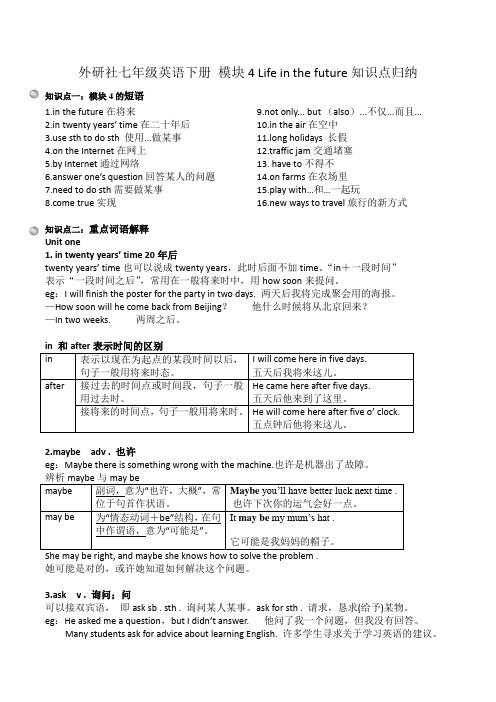
外研社七年级英语下册模块4 Life in the future知识点归纳知识点一:模块4的短语1.in the future 在将来2.in twenty years’ time在二十年后e sth to do sth 使用...做某事4.on the Internet 在网上5.by Internet 通过网络6.answer one’s question 回答某人的问题7.need to do sth 需要做某事e true 实现9.not only... but (also)...不仅...而且...10.in the air 在空中11.long holidays 长假12.traffic jam 交通堵塞13. have to 不得不14.on farms 在农场里15.play with…和…一起玩16.new ways to travel 旅行的新方式知识点二:重点词语解释Unit one1. in twenty years’ time 20年后twenty years’ time也可以说成twenty years,此时后面不加time。
“in+一段时间”表示“一段时间之后”,常用在一般将来时中,用how soon来提问。
eg:I will finish the poster for the party in two days. 两天后我将完成聚会用的海报。
—How soon will he come back from Beijing?他什么时候将从北京回来?—In two weeks. 两周之后。
in 表示以现在为起点的某段时间以后,句子一般用将来时态。
I will come here in five days. 五天后我将来这儿。
after 接过去的时间点或时间段,句子一般用过去时。
He came here after five days. 五天后他来到了这里。
接将来的时间点,句子一般用将来时。
Unit 3 Life in the future教案

Unit 3 Life in the future教案一、教学目标1、知识目标学生能够掌握与未来生活相关的词汇和短语,如“flying car”“space travel”“virtual reality”等。
学生能够理解并运用一般将来时和将来进行时来描述未来的情景。
2、能力目标通过阅读和听力训练,提高学生获取信息和理解文章的能力。
培养学生的口语表达能力,使他们能够流利地谈论未来生活。
3、情感目标激发学生对未来生活的想象和憧憬,培养创新思维。
引导学生关注科技发展对人类生活的影响,树立正确的科技观。
二、教学重难点1、教学重点重点词汇和短语的理解与运用。
一般将来时和将来进行时的正确使用。
2、教学难点如何引导学生展开丰富的想象,描述未来生活的情景。
培养学生对科技发展的辩证思维。
三、教学方法1、情景教学法通过创设未来生活的情景,让学生身临其境,感受未来的变化。
2、任务驱动法布置各种任务,如小组讨论、写作等,让学生在完成任务的过程中掌握知识和技能。
3、多媒体辅助教学法运用图片、视频等多媒体资源,直观地展示未来生活的场景,激发学生的学习兴趣。
四、教学过程1、导入(5 分钟)播放一段关于未来科技的视频,如飞行汽车、智能家居等,引起学生对未来生活的兴趣。
提问学生:“What do you think life will be like in the future?”让学生自由发言,分享他们对未来生活的想法。
2、词汇学习(10 分钟)展示与未来生活相关的图片,如太空站、机器人、3D 打印食物等,教授新词汇和短语,如“space station”“robot”“3Dprinted food”等。
让学生进行词汇练习,如单词拼写、造句等,巩固所学词汇。
3、语法讲解(15 分钟)讲解一般将来时和将来进行时的构成和用法,通过例句进行对比分析,让学生明白两者的区别。
给出一些句子,让学生判断使用一般将来时还是将来进行时,并说明原因。
外研版七年级英语下册 Module 4 Life in the+future专题讲解(有答案)

外研版英语七年级下册Module4 Life in the future专题讲解Name:__________________本单元提纲1. 主题功能:能够谈论未来的生活2. 重点单词:change, ask, traffic, cheap, heavy, hour 等。
3. 重点短语:in the future, not...any more, on the internet, come true, heavy rain 等。
4. 核心句型:Will school be different in the future?Everyone will study at home.等。
语法结构:will结构的一般将来时重难点精讲Will school be different in the future?将来学校会不一样吗?本句是一般将来时的一般疑问句,结构为“will+主语+动词原形+其它?”。
该句式的答语有两种形式:肯定回答Yes,主语+will否定回答No,主语+won’t一般将来时表示的是未来的事情或者是对将来的预测,will没有人称和数的变化。
如果表示将来不会,就要用will not或者缩写成won’t。
题一:翻译:那边将会有一个大型的公园。
将来每张桌子上都会有一台电脑。
我想人人都将用电脑学习。
他们将不用课本。
学校里会有电脑吗?In the future意为“将来,未来”。
in the future 意为“将来”in future 意为“今后,以后”,相当于from now onIn twenty years’ time, maybe there won’t be any schools.在20年后,也许将不会有任何学校。
in twenty years’ time意为“在20年后”,其中years’是名词所有格结构。
在一般将来时中,“in+时间段”表示“在一段时间之后”。
题二:翻译:谁知道将来会发生什么事情?今后多注意你的拼写。
七年级英语下册《Life in the future》重难点解析
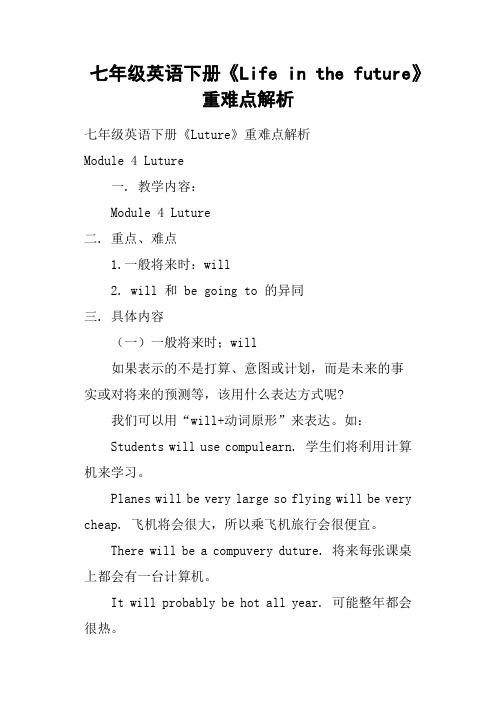
七年级英语下册《Life in the future》重难点解析七年级英语下册《Luture》重难点解析Module 4 Luture一. 教学内容:Module 4 Luture二. 重点、难点1.一般将来时:will2. will 和 be going to 的异同三. 具体内容(一)一般将来时;will如果表示的不是打算、意图或计划,而是未来的事实或对将来的预测等,该用什么表达方式呢?我们可以用“will+动词原形”来表达。
如:Students will use compulearn. 学生们将利用计算机来学习。
Planes will be very large so flying will be very cheap. 飞机将会很大,所以乘飞机旅行会很便宜。
There will be a compuvery duture. 将来每张课桌上都会有一台计算机。
It will probably be hot all year. 可能整年都会很热。
No one will do heavy work. 没有人干重活。
Robots will do everything for us. 机器人会替我们做所有的事情。
可以看出,will表示的一般将来时,本身没有人称和数的变化。
如果要表达“将来不会……”,就要用其否定形式,我们可以在will后直接加not,构成will not或缩写为won’t。
如:Students will studIThey won’t use b学生们将在互联网上学习。
他们将不再使用书。
The teachers won’t wblackboard with chalk. 老师们将不再用粉笔在黑板上写字。
如果询问将来的事,我们用其疑问形式,即将will 提到句首即可。
如:Will students gluture? 将来学生们还去学校吗? Will there be compul? 学校里会有计算机吗?Will people do many thingInternet? 人们会在互联网上做许多事情吗?下面我们将will的句式总结如下:I will have maI won’t have ma*Will I have ma?*Yes, I will.No, I won’t.He will do dull jobs.He won’t do dull jobs.Will he do dull jobs?will.No, he won’t.There will be a com- puvery desk.There won’t be a com- puvery desk.Will there be auvery desk?will.Nwon’t.They will do heavywThey won’t do heavywWill they do heavywork?will.Nwon’t.注* 代表自问自答(二)词汇cable TV,calculator,cell phone,computer,email,Internet,satellite,climate,education,,technology,transport,machine,comfortable,rough,strong,expensive,smooth,dull(三)Texveryone will study auture. 将来每个人都在家里学习。
初三英语Life in the Future教程

初三英语Life in the Future教程英语是联合国的工作语言之一。
英语也是与电脑联系最密切的语言,大部分编程语言都与英语有联系,而且伴随互联网的采用,使英文的采用更普及。
今天我们要与大家共享的是:初三英语《Life in the Future》教程,具体内容如下:一. 教学内容:Book 15 Unit 2会采用动词一般将来时描述预测将要发生的事件,将来的生活。
明白will, shall 和be going to 的区分。
二. 本周教学重点:1. 一般将来时2. 重点词语和词组3. 课文主要内容三. 具体内容:一般将来时使用方法:1. 表示将要发生的动作或存在的状况。
He will go to New York next year.2. 表示将要反复发生的动作或习性性动作。
We shall have two P.E. lessons per week this term. 结构:1. shall/ will + 动词原形shall 用于第一人称。
I shall go to Shanghai after graduation.They will go to Shanghai after graduation.基本句式:必定句:主语+shall/will+动词原形+其他Our teacher will have a meeting tomorrow.否定句:主语+shall/will not+动词原形+其他They wont go swimming this weekend.疑问句:shall/will +主语+动词原形+其他?Will Tom finish his homework on time?Yes, he will. /No, he wont.2. be going to +动词原形be 随主语的变化而变化。
It is going to rain.We are going to swim this weekend.基本句式:必定句:主语+be going to +动词原形+其他I am going to buy a dictionary this afternoon.否定句:主语+be not going to +动词原形+其他We are not going to stay here long.疑问句:Be + 主语+ going to + 动词原形+其他Is it going to rain tomorrow?Yes, it is. /No, it isnt.3. will/shall 和be going to 的区分:1)will 表示说话人认为,期望或假定要发生的事。
一般将来时未来生活英语作文初一

一般将来时未来生活英语作文初一全文共3篇示例,供读者参考篇1The Future LifeIn the future, I believe that our lives will be very different than they are now. With the advancement of technology and the changes in society, our future will be shaped by new inventions, improved communication and a more sustainable way of living.One of the biggest changes I believe we will see in the future is in transportation. With the development of electric cars,self-driving vehicles and high-speed trains, our modes of transportation will become more efficient, faster and environmentally friendly. This will help reduce air pollution and traffic congestion in cities, making our lives easier and more convenient.In terms of communication, I think we will be able to connect with people from all over the world instantly. With the improvement of internet speed and the development of virtual reality technology, we will be able to have real-timeconversations with people from different countries, making the world a smaller and more interconnected place.Another aspect of our future life will be the focus on sustainability and environmental protection. With the increasing awareness of climate change and the need to protect our planet, I believe we will see more people adopting eco-friendly practices in their daily lives. This could include using renewable energy sources, reducing waste and recycling more.In terms of education, I believe that in the future, we will see a shift towards more personalized and flexible learning methods. With the rise of online education platforms and digital learning tools, students will be able to learn at their own pace and in a way that suits their individual learning styles.Overall, I believe that our future life will be shaped by technology, sustainability and a more interconnected world. With these changes, I am optimistic that we will be able to create a more prosperous, sustainable and harmonious society for future generations to enjoy.篇2The Future Life in Simple Future TenseIn the future, people will live in a world full of advanced technology and innovation. Everyday life will be drastically different from what we experience now. In this essay, I will describe what life will be like in the future using simple future tense.In the future, technology will play a huge role in our lives. People will have robots to help with household chores and tasks. These robots will be able to cook meals, clean the house, and even take care of pets. People will also have self-driving cars that will take them to their destinations without the need for a driver.Education will also be revolutionized in the future. Students will attend virtual classrooms where they can interact with their teachers and classmates from around the world. They will be able to access information and learn new things at the touch of a button. With the help of technology, education will be more accessible and personalized for each student.Healthcare will also be vastly improved in the future. Doctors will be able to diagnose and treat illnesses more accurately and efficiently. With the use of advanced technology, diseases will be detected at an early stage, and treatments will be tailored to each individual. People will live longer, healthier lives thanks to these medical advancements.In terms of transportation, there will be more environmentally-friendly options available. Electric cars and public transportation powered by renewable energy sources will be the norm. People will be more conscious of their carbon footprint and strive to reduce their impact on the environment.In conclusion, life in the future will be vastly different from what we know today. Technology will continue to advance and improve our lives in many ways. People will have more opportunities to learn, work, and live comfortably. It is an exciting time to look forward to, and I can't wait to see how the future unfolds.篇3Title: Future Life with the Use of Simple Future TenseIn the future, life will be very different from what it is today. With the constant advancement of technology and innovation, our daily lives will become more convenient and efficient. Using the simple future tense, let's explore what our future life might look like.In the future, technology will play a much greater role in our lives. We will have self-driving cars that will take us to our destinations without the need for us to drive. These cars will beequipped with advanced AI systems that will ensure safe and smooth journeys for passengers.Our homes will also become smarter with the use of artificial intelligence. We will have smart devices that can control the lighting, temperature, and security systems of our homes with just a simple voice command. These devices will make our lives more convenient and comfortable.Furthermore, in the future, medical advancements will enable us to live longer and healthier lives. With the use of advanced diagnostic tools and treatments, diseases will be detected and cured at an early stage, ensuring better health outcomes for everyone.Education will also undergo major changes in the future. With the use of virtual reality technology, students will be able to immerse themselves in realistic learning environments, making education more engaging and effective. Online learning platforms will also become more personalized, catering to the individual learning needs of each student.In conclusion, the future holds a lot of promise for us. With the use of simple future tense, we can imagine a world where technology, healthcare, education, and various other aspects of our lives have been transformed for the better. It is up to us toembrace these changes and make the most of the opportunities that the future has in store for us.。
初中英语一般将来时详细讲解

初中英语一般将来时讲解初中英语一般将来时(Simple Future Tense)用于表示将来某个时间会发生的动作或存在的状态。
下面是初中英语一般将来时的详细讲解:一、构成:1.一般将来时的肯定句结构为:主语 + will + 动词原形2.一般将来时的否定句结构为:主语 + will not (won't) + 动词原形3.一般将来时的疑问句结构为:Will + 主语 + 动词原形?二、用法:1. 表示未来的事实、计划或打算:①I will visit my grandparents next week.(我下周会去看望我的祖父母。
)②We will have a party on Saturday.(我们周六要开个派对。
)2. 表示预测或推测:①It will rain tomorrow.(明天会下雨。
)②He will probably be late for the meeting.(他可能会迟到会议。
)3. 表示意愿、请求、建议等:①Will you please help me with my homework?(你能帮我做作业吗?)②I will do my best to help you.(我会尽力帮助你。
)4. 表示承诺或威胁:①I will always love you.(我会永远爱你。
)②If you don't listen to me, I will tell the teacher.(如果你不听我的话,我会告诉老师。
)注意事项:1. 在一般将来时中,主语通常是第一人称(I/we)或第三人称(he/she/it/they),而第二人称(you)在肯定句和否定句中都是一样的。
2. 一般将来时的疑问句需要将助动词will放在句首。
3. 在一般将来时中,表示将来时间的副词或时间状语可以与will连用,如tomorrow, next week等。
三、总结:初中英语一般将来时用于表示未来某个时间会发生的动作或存在的状态,可以用于表达事实、计划、预测、意愿、请求等。
初二下册Unit 8 Life in the future知识讲解
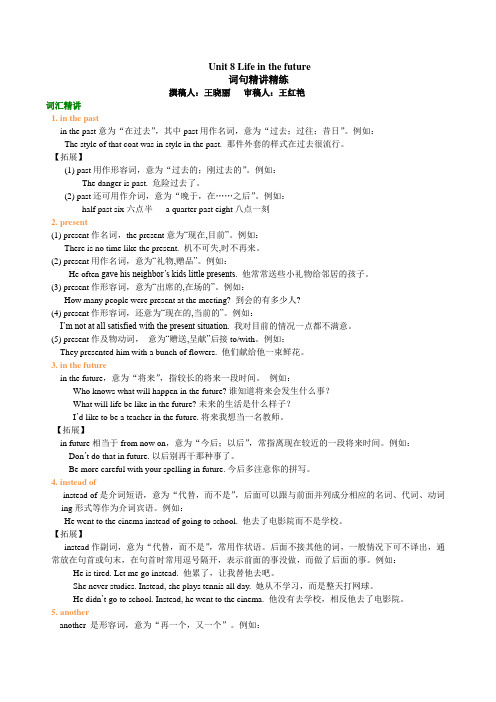
Unit 8 Life in the future词句精讲精练撰稿人:王晓丽审稿人:王红艳词汇精讲1. in the pastin the past意为“在过去”,其中past用作名词,意为“过去;过往;昔日”。
例如:The style of that coat was in style in the past. 那件外套的样式在过去很流行。
【拓展】(1) past用作形容词,意为“过去的;刚过去的”。
例如:The danger is past. 危险过去了。
(2) past还可用作介词,意为“晚于,在……之后”。
例如:half past six六点半 a quarter past eight八点一刻2. present(1) present作名词,the present意为“现在,目前”。
例如:There is no time like the present. 机不可失,时不再来。
(2) present用作名词,意为“礼物,赠品”。
例如:He often gave his neighbor’s kids little presents. 他常常送些小礼物给邻居的孩子。
(3) present作形容词,意为“出席的,在场的”。
例如:How many people were present at the meeting? 到会的有多少人?(4) present作形容词,还意为“现在的,当前的”。
例如:I’m not at all satisfied with the present situation. 我对目前的情况一点都不满意。
(5) present作及物动词,意为“赠送,呈献”后接to/with。
例如:They presented him with a bunch of flowers. 他们献给他一束鲜花。
3. in the futurein the future,意为“将来”,指较长的将来一段时间。
七下外研版M4Life in the future wil一般将来时专讲 专讲

一般将来时 will 的用法
will主要用在以下几个方面: 1. 某人将要去做的事情,大致相当于be going to。
He will write a book one day. She will do her homework. We will win. They will do heavy work. I will visit Shanghai.
Will变一般疑问句要点: will提到句首, some变any, and 改为or,第一二人称互换。
will将来时一般疑问句练习
将下列句子改为一般疑问句。
1.I will fly in the sky one day. Will you fly in the sky one day ? 2.We will go to school by plane. Will you go to school by plane ? 3.She will buy some apples. Will she buy any apples? 4.I will borrow some interesting fictions. Will you borrow any interesting fictions? 5.Students will travel by plane and rocket. Will students travel by pane or rocket ? 6.Students will use pens, paper and erasers to do their homework. Will students use pens, paper or erasers to do their homework?
Will句型结构
will特殊疑问句: 特殊疑问词+will+主语+do +其他?
七年级英语Life_in_the_future课件

2.It will get warm at the North Pole. South
1.True or False
It will be cheap to heat our homes.( T ) Homes will be comfortable. Because in winter we can use the sun to heat our homes. There will be lots of hot water.
4 Will teachers send emails to students ?
Activity 3
Answers
1 New cars will be small .
2 Machines will do heavy work in factories . 3 People will have long holidays . 4 There will be strong winds in spring and autumn . 5 We’ll speak good English . 6 Flying in large planes will be cheap .
Everyone will study at home.
cable TV
We will have cable TVs at every home.
satellite TV
We will also have satellite TVs at every home.
calculator
We don’t use a calculator when we learn English.
Listen and check( √
初中英语《Module4Lifeinthefuture》单元教学设计以及思维导图
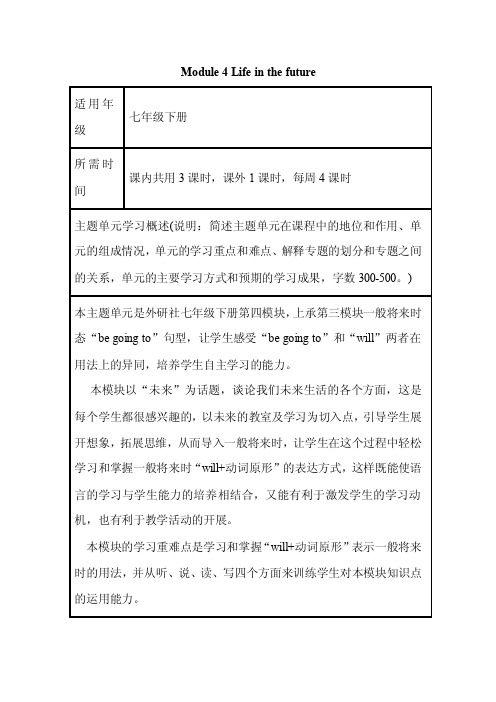
易,将知识不断内化和外延。 情感态度与价值观: 1. 通过本模块相关内容的学习,培养学生做事要有计划的好习 惯,并抱有对未来的生活充满希望的好心态。 2. 通过教材中有关未来生活的描述,让学生了解未来生活的巨大 变化,引导学生努力学习,为实现美好生活的目标而奋斗。 3. 通过用一般将来时来谈论未来生活,培养学生与他人合作的意识。
过程与方法: 利用多媒体展示图片,带领学生描述未来的教室和学习 情况, 通过听录音、模仿对话、提问、小组合作等方式来学习短文。 情感态度与价值观:开拓学生思维,启发学生发挥想象,培养学生的 合作意识。
1. 专题问
2. 题设计
3.
Will schools be different in the future? How will students learn then? Will students have a lot of homework to do?
专 题 一 : Everyone will study at
home.
( 1 课时)
专 题 二 : Every family will have a small
plane.
( 2 课时)
专题三:Language in use
(1课
时)
„„„„
其中,专题 一 中的活动三和四作为研究性学习)
专题一 Everyone will study at home.
主题单
1. 元问题
2. 设计
What will schools be like in the future? What will life be like in the future?
专 题 划 (说明:除了说明主题单元将划分成几个专题以及每个专
模块4-Life-in-the-future知识点归纳
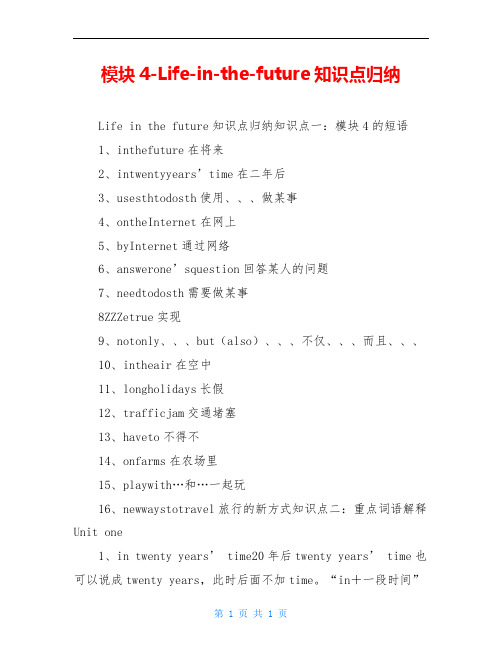
模块4-Life-in-the-future知识点归纳Life in the future知识点归纳知识点一:模块4的短语1、inthefuture在将来2、intwentyyears’time在二年后3、usesthtodosth使用、、、做某事4、ontheInternet在网上5、byInternet通过网络6、answerone’squestion回答某人的问题7、needtodosth需要做某事8ZZZetrue实现9、notonly、、、but(also)、、、不仅、、、而且、、、10、intheair在空中11、longholidays长假12、trafficjam交通堵塞13、haveto不得不14、onfarms在农场里15、playwith…和…一起玩16、newwaystotravel旅行的新方式知识点二:重点词语解释Unit one1、in twenty years’ time20年后twenty years’ time也可以说成twenty years,此时后面不加time。
“in+一段时间”表示“一段时间之后”,常用在一般将来时中,用how soon来提问。
eg:I will finish the poster for the party in two days、两天后我将完成聚会用的海报。
In two weeks、两周之后。
in 和after表示时间的区别in表示以现在为起点的某段时间以后,句子一般用将来时态。
I will come here in five days、五天后我将来这儿。
after接过去的时间点或时间段,句子一般用过去时。
He came here after five days、五天后他来到了这里。
接将来的时间点,句子一般用将来时。
He will come here after five o’ clock、五点钟后他将来这儿。
2、maybe adv 、也许eg:Maybe there is something wrong with the machine、也许是机器出了故障。
一般将来时写未来的变化英语作文

一般将来时写未来的变化英语作文My Life in the FutureI am so excited to tell you all about how my life will be in the future! There are going to be so many amazing things happening.I can't wait to grow up and experience it all.First of all, by the time I'm a grown-up, technology will have advanced incredibly. Computers and phones are going to be a million times smarter and more powerful than they are today. We'll have virtual reality headsets that make you feel like you're actually inside video games or movies! Robots will help us do chores and run errands. Some people will even have robot assistants to help them with everyday tasks.Flying cars will be a normal way to get around in the future. They'll be powered by electricity instead of gasoline, so they won't cause any pollution. The cars will be self-driving too, using sensors and computers to navigate the roads and skies. I'll just need to program my destination into the car's computer and then sit back and relax during the trip. How awesome is that?In school, we won't have to sit at desks and take notes anymore. We'll wear special glasses that project holographic teachers and lessons right in front of our eyes. The glasses willalso have games and activities built-in to help us learn in fun, interactive ways. No more carrying heavy backpacks full of books either - all our textbooks and homework will be digital.Speaking of books, they'll be really high-tech too. The pages will change every time you open the book, displaying brand new stories and adventures. Some books will even talk to you and let you join in on the stories as a character! Libraries are going to be incredibly cool.When I grow up, having robots do all the cleaning and yardwork will free up so much of my time. I'll get to focus on my hobbies and the things I love doing instead of spending hours on chores. I'm definitely going to have a robot chef that can whip up any meal I want with just a voice command. No more worrying about what to cook for dinner!My future home is going to be amazing too. The windows will tint automatically to keep out bright sunlight. The lights and temperature will adjust themselves based on my preferences. I'll even have a holographic home assistant to help manage the household systems. Maybe I'll install a cool holographic entertainment room to watch 3D movies too!Travel is going to be a total blast in the future. Vacation resorts on the moon? Undersea hotels? Flights through theupper atmosphere in specialized aircraft? Sign me up! I can't wait to experience exciting and unique getaways that you could only dream of nowadays.One of the biggest game-changers will be how medicine advances over the coming decades. Doctors will use nanotechnology to repair our bodies from the inside out. They might even find cures for Cancer, Alzheimer's, and all sorts of other diseases that are tough to treat today. Can you imagine a world without those terrible illnesses? It's going to be incredible.Of course, some things will stay the same no matter how much technology progresses. I'll still hang out with my friends, even if it's in a virtual reality chat room instead of at the park. Families will still go on fun outings together, they just might be to the orbiting space resort instead of the water park. And kids will always find ways to goof off and get into trouble, even with all our future high-tech gizmos and gadgets!There are so many other awesome changes headed our way - too many for me to cover in this essay. Flying personal drones, undersea colonies, holographic home entertainment systems...the future is going to be an amazing place. I can't wait to grow up and experience it all for myself. The 22nd century isjust around the corner, and I'll be ready to embrace it with open arms! Who's coming with me?。
初中一般将来时,(life in the future),结合课文讲解27页PPT
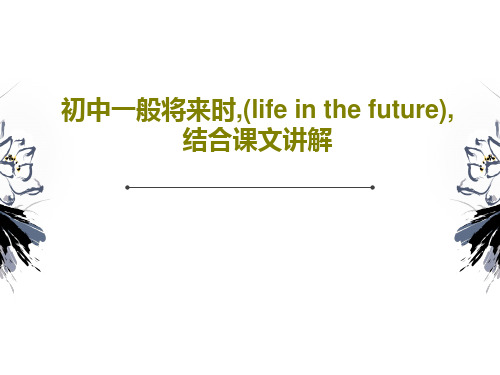
36、“不可能”这个字(法语是一个字 ),只 在愚人 的字典 中找得 到。--拿 破仑。 37、不要生气要争气,不要看破要突 破,不 要嫉妒 要欣赏 ,不要 托延要 积极, 不要心 动要行 动。 38、勤奋,机会,乐观是成功的三要 素。(注 意:传 统观念 认为勤 奋和机 会是成 功的要 素,但 是经过 统计学 和成功 人士的 分析得 出,乐 观是成 功的第 三要素 。
39、没有不老的誓言,没有不变的承 诺,踏 上旅途 ,义无 反顾。 40、对时间的价值没有没有深切认识 的人, 决不会 坚韧勤 勉。
61、奢侈是舒适的,否则就不是奢侈 。——CocoCha nel 62、少而好学,如日出之阳;壮而好学 ,如日 中之光 ;志而 好学, 如炳烛 之光。 ——刘 向 63、三军可夺帅也,匹夫不可夺志也。 ——孔 丘 64、人生就是学校。在那里,与其说好 的教师 是幸福 ,不如 说好的 教师是 不幸。 ——海 贝尔 65、接受挑战,就可以享受胜利的喜悦 。——杰纳勒 尔·乔治·S·巴顿
- 1、下载文档前请自行甄别文档内容的完整性,平台不提供额外的编辑、内容补充、找答案等附加服务。
- 2、"仅部分预览"的文档,不可在线预览部分如存在完整性等问题,可反馈申请退款(可完整预览的文档不适用该条件!)。
- 3、如文档侵犯您的权益,请联系客服反馈,我们会尽快为您处理(人工客服工作时间:9:00-18:30)。
Ⅲ. Fill in the blanks.
1. What _______ you ______ (do) this Sunday? will do will be There _____ _____ (be) a football match. go Will ______ you _______ (go) with us? 2. I _____ ______ (go) to see your father as soon will go as I get to Beijing. will be 3. I think it ______ _____ (be) rainy tomorrow. 4. My father _____ ______ (send) me a new bike will send when I am tall enough.
一般将来时
概念:将来发生的动作或情况,常与表示将来时间 的词或短语连用,如tomorrow, next week, the day after tomorrow, in the future, in a few days
构成:shall(用于第一人称) + 动词原形 will + 动词原形 be going to + 动词原形
Fuel: ['fju:əl] n.燃料
Homes will be warm in winter and cool in summer, so they’ll be very comfortable. We’ll use the sun to heat our homes. No one will be cold and there’ll be lots of hot water. 家里会冬暖夏凉,因此人们会很舒适。我们会用太阳能取暖。没 有人会受凉,家里会有很多热水。
Computers will be very small so they’ll be very light. People will do many things on the Internet. 电脑将会很小,因此他们会很轻。人们将会用因 特网做很多事。
Group work:观察总结一般将来时用法
1
2
3
4
5
1. I think every home will a car. A. be B. have C. has D. there be 2. will there be more trees? Yes, . A. they will B. there will C. there will be D. there have 3.Will there more cars in people’s homes? A. have B. has C. be D. /
1. I will help my mother do the housework tomorrow. 2. --- Will your parents go to Paris next --- Yes, they will./ No, they won’t. 3. Kate is going to swim tomorrow afternoon. 4. Tom is visiting his grandparents next weekend. 5. There will be more trees in the future.
Yes, I shall. / Yes, I will. 简略回答 No, I shan’t. / No, I won’t.
1,读课文两次,划出重点结构。 2,用一般将来时写一篇小文章描述你的未来生活。
Have you seen this film?
Simba
What life will be like in the future?
planes will be very large so flying will be very cheap. 飞机会很大,所以乘飞 机会非常便宜。
Fuel will be expensive. Everyone will have a small car. 燃料将非常贵。每个人都会有辆小 汽车。
5. Tomorrow is Saturday. We ___to school. A. will go B. won’t go C. can go D. went
一般将来时
肯定句 主语 + shall / will +V原形
否定句 主语 + shall / will +not + V原形
一般疑问句 Shall / Will +主语 + V原形
